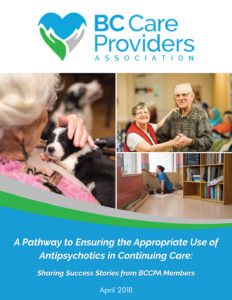Burnaby, B.C. (April 26, 2018) – The inappropriate use of antipsychotic medications among seniors, particularly in residential care, is an issue of growing public concern. Research shows 25 per cent of residents in B.C.’s long-term care homes are taking antipsychotics without a diagnosis of psychosis.

In 2013, BC Care Providers Association published a member-led guide which focused on successful interventions that safely reduced the use of antipsychotic medications in care homes.
Today, BCCPA released a renewed guide—A Pathway to Ensuring the Appropriate Use of Antipsychotics in Continuing Care—which shares the success stories of 11 BCCPA members who reduced their rate of inappropriate antipsychotic use through non-pharmacological interventions, such as music and art therapy, pet therapy, exercise programs, social engagement and more.
“The care teams featured in this guide deserve to be recognized for their dedication to ensure the appropriate use of all medications, particularly antipscyhotics,” says Lara Croll, who helped develop the guide as a policy analyst for BCCPA. “Their input and support in crafting the best practices will allow many more care homes to reduce inappropriate antipsychotic prescribing.”
Although originally developed to treat schizophrenia and bipolar disorder, antipsychotics are now commonly prescribed to treat behavioural and psychological symptoms associated with dementia. Research show the drugs provide limited benefit and cause serious harm, increasing the risk of falls, infections, stroke and even premature death.
New guidelines, resources and initiatives that cropped up across B.C. and Canada to address the concerns have helped care homes significantly reduce the use of antipsychotics—from 34 per cent in 2012 to 26 per cent in 2016. Yet the use of antipsychotics in B.C.’s care homes remains above the national average.
“Challenges with reducing antipsychotics use among seniors prove that we need more than interventions—we need a shift in culture,” says BCCPA CEO Daniel Fontaine.
The guide, developed by BCCPA’s Quality Committee, shows how interdisciplinary teams, evidence-based solutions, change in management strategies, and the involvement of residents and their families in care planning are all necessary steps to effective antipsychotic reductions.
“We’re confident that implementing best practices outlined in the guide, and shifting towards person-centered approaches in long-term care will lead to culture transformation in the sector, and better safety and quality of life for B.C. seniors,” he adds.
Media Contact
Rumana D’Souza
rumana@bccare.ca
(604) 736-4233, ext. 235
About BC Care Providers Association
Established in 1977, the BC Care Providers Association (BCCPA) is the leading industry association for B.C.’s continuing care sector. Our growing membership base includes over 300 residential care, assisted living, home care and commercial members from across British Columbia.




